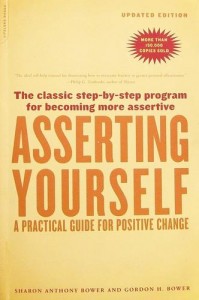Okay, so this isn’t exactly a story, but as soon as I read it I knew I had to include it in the Equally Yoked series. Gerald Ford was a pastor for over 40 years, and is a licensed counselor and marriage and family therapist at the Houston Center for Christian Counseling. This article gets to the root of many unhealthy patterns in marriage, and suggests the solution: mutuality.
Terry Real, the author of many books about recovery from addictions, depression, anxiety, etc., has offered a model for the male/female power struggle found in many marriages. I think we can gain from looking at it.
He states that men tend to lead their life from a grandiose power position and have covert issues of shame.
Then, he states that women tend to lead their life from a one-down victim position and have covert issues of grandiosity.
Now, it is hard for me to write about stereotypes, and not throw in a disclaimer, so here it is. I don’t like to think in terms of stereotypes, and I don’t communicate or live according to the expectations set forth by them. However, there are reasons that stereotypes exist, one being that there are lots of people who fit them, feed them, and even cheer for their existence.
I see clients in my marriage counseling practice trying to break free from these stereotypes. Sadly, I see some trying to make them less abusive than they are, but not trying to break free, but generally these efforts don’t work. I am most sad for those couples where one person is trying to break free from the stereotype and the other is trying to reinforce the stereotype. So, knowing that not everyone fits a stereotype (thankfully), and that many are trying to avoid or get out of one, let’s take a look at these traps.
 The grandiose power position may be one that people offer their sons out of good intentions. After all, this cold and cruel world requires strong participants. The problems, however, include the mistake of not raising strong daughters as well as strong sons, and the bigger mistake of teaching our sons that power is power over others, power in appearance and swagger, but not power of character and love. Hence, the appearance of strength is based on the power to dominate, and behind this façade there lurks great shame.
The grandiose power position may be one that people offer their sons out of good intentions. After all, this cold and cruel world requires strong participants. The problems, however, include the mistake of not raising strong daughters as well as strong sons, and the bigger mistake of teaching our sons that power is power over others, power in appearance and swagger, but not power of character and love. Hence, the appearance of strength is based on the power to dominate, and behind this façade there lurks great shame.
Shame has been ignored by many, but well researched by others, especially Donald Nathanson, whose writing I highly recommend if you want to know more. Briefly, shame is that deep and often hidden belief that there is simply something wrong with us, that isn’t wrong with “most people,” that when exposed will bring us accentuated humiliation and disgrace, even exclusion from the community of humankind. In shame, we come to see ourselves as defective and unlovable. Grandiose Power offers us a mask, keeping the “truth” as we fear it to be from being seen by others. Many men accept this trap, not knowing that there is any other acceptable way to live.
The one-down victim position is often introduced to daughters as “just the way it is” for women. This position may be offered in compliance to social norms that are built to keep women “in their place.” Early in life, brothers are offered some grandiosity by being told they must “protect” their sister. She fits into the mold made for her by society, not because she really fits, but because society doesn’t like it when the molds it builds are not filled. (Just look at Jesus’ description of the Pharisees’ complaints against him, “They are like children who sit in the market place and call to one another, and they say, ‘We played the flute for you, and you did not dance; we sang a dirge, and you did not weep.’” Luke 7:32.)
The one-down victim position soon becomes a power position all its own. It morphs into the belief that one is entitled to be taken care of by someone else. Secrets are conveyed about how to win from the one-down position. (Oh, Rhett, you’re so good to me .) Women are told, by some, that the subservient position is one they will actually enjoy. Worse, they are told, by some, that God requires them to be subservient. Victimhood is often characterized as humility or kindness, which it is not. Humility and kindness are often characterized as weakness, which they are not. In this mix, we fail to teach our daughters, and our sons, the true nature of humility and kindness, traits that Jesus himself exhibits, and is by no means weak.
Victimhood also offers a mask to women, a mask for covert grandiosity, keeping the “truth” as they fear it to be from being seen by others. The truth being that, she also is tempted to control others through covert power. She needs courage to face life as a strong woman, and is just as capable as men are to find courage and strength, and humility and kindness, in being a disciple of Christ. Many women accept this trap of Victimhood, not knowing that there is any other acceptable way to live.
Meanwhile, back at the counseling room, I am dealing with multiple dilemmas.
-First of all, this couple coming to me for counseling may be so caught up in the power struggle, and the pain and anger of the relationship, that they have little ability to hear. The bully thinks I am trying to talk them off of their throne, and in a sense, I am. The woman who feels victimized may think I am minimizing her pain, when in reality I am not; I am trying to minimize her helplessness.
–Add to this struggle the voices of people in their church who are only reinforcing the stereotypes with poor theology, shaming and threatening tactics, and syrupy approvals of the games people play.
-Third, they may have even heard the stereotype fostered by previous therapists, and by the many books on the market that foster the patriarchy.
How to move for change is a difficult issue, since change, at least at someone else’s request, is not one of humankind’s favorite pursuits. We are asking this person to change the maps in their life and in the relationship, and it won’t go well if that change doesn’t look like it will be beneficial for both parties, or if the change won’t fit into the other person’s schema of how they want to live life. Collaboration won’t fit the lifestyle of the person who wants Power Over Others, whether through grandiosity or through victimhood, and it won’t fit the lifestyle of the person who demands that they be taken care of by others.
I have one model to suggest, and along with it, a mindset. The model belongs to Sharon Anthony Bower and Gordon H. Bower, from the book Asserting Yourself, published by Da Capo Press. Briefly, their model says to be assertive by
1. Describing the experience one has just had in objective terms,
2. Expressing how it has been experienced, speaking only for self,
3. Specifying one’s expectations and intentions for the future, and
4. Sharing and clarifying the consequences which can be expected as the efforts at change either succeed or fail.
I urge you to get the book, digest it, and use it. It will empower the way you communicate. The mindset is akin to good assertive communication, it is assertive thinking. Assertive thinking is:
1. thinking for oneself, and
2. thinking for understanding (not to agree or disagree),
3. without taking on a compulsion either to please the other person
4. or to change their mind.
Let me make one more recommendation, and that is Terry Real’s book, The New Rules of Marriage. It’s excellent reading, too.

 Gerald Ford is a minister, a licensed professional counselor, and a licensed marriage and family therapist at the Houston Center for Christian Counseling in Sugar Land, TX. After over 40 years of pastoring, he continues to do pulpit fill, and runs workshops on a variety of topics, including Collaborative Marriage Skills. His wife Billie Ritter, an “intriguing and fascinating woman,” is an independent historian and an ordained minister.
Gerald Ford is a minister, a licensed professional counselor, and a licensed marriage and family therapist at the Houston Center for Christian Counseling in Sugar Land, TX. After over 40 years of pastoring, he continues to do pulpit fill, and runs workshops on a variety of topics, including Collaborative Marriage Skills. His wife Billie Ritter, an “intriguing and fascinating woman,” is an independent historian and an ordained minister.
Next week’s Equally Yoked post is from Anne-Frederique Gass.
Want to contribute to the Equally Yoked series? Email Jenny at jennyraearmstrong@gmail.com.
Leave a comment for a chance to win How I Changed My Mind About Women in Leadership: Compelling Stories from Prominent Evangelicals. Winner announced Feb. 1st.


10 Responses to Gerald and Billie Ritter Ford: Grandiosity vs. Victimhood